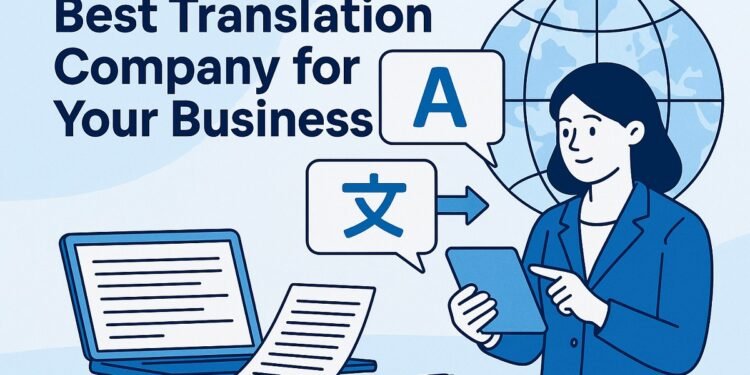Today, whose businesses operate across geographical boundaries? Companies themselves-this-anywhere from smallest to biggest who try to penetrate international markets where language often becomes the foremost barrier.
Clear and accurate communication in the local language for marketing material, legal contracts, technical documents, or websites is essential. This is where professional translation services enter. An appropriate translation company will not just translate your words, but will hold onto the meaning, tone, and cultural relevance.
Thus, many companies are prone to hire unverified translators or place the entire trust in free machine translation, which leads to miscommunication and a loss of face. A professional translation company, conversely, guarantees accuracy, compliance, and cultural adaptation. With so many service providers out there, it may indeed be quite a task to find that one that fits your business.
5 Ways to Choose the Best Translation Company
Expertise, industry knowledge, technology, and price are all aspects to consider in making the right choice. Most of this blog covers practical tips to help you select the translation company best suited for your business needs and succeed in global communication.
#1. Understand Your Business Requirements
Before actually engaging the services of somebody else, the company has to really figure out what it needs. Would the company be looking for document translation, localization for their site, or maybe for some sort of bilingual customer support? Having a clear idea of what their project will entail will help narrow the search to companies that have the necessary experience. For instance, legal or medical translation services require that the translators be highly specialized in their professional fields, whereas translations for e-commerce websites generally might need cultural adaptation and SEO optimizations. By being clear on your requirements, you eliminate paying extra for unnecessary services and being able to select companies with the right capacity to suit your project.
#2. Check Industry Specialization
Translation providers never offer the same services and translations. Many are professional in legal translation, while others have their place in the technical, financial, and medical fields. Having translation experience in a particular industry gives you assurance that your translation works are correct, and adequate industry standards have been applied. For example, it is imperative that translation agency working for pharmaceutical companies do not introduce errors in the medical instructions for use, as do the financial reporting agencies for financial institutions. A translation company aware of the nuances of your industry reduces risk, strengthens credibility, and offers content that respects professional and cultural standards.
#3. Evaluate Linguistic and Cultural Accuracy
Translating language is one thing- another is trying to make sure that meaning and context remain intact. With such content at hand, a good translation company will ensure it speaks to its target audience in the original intent. This is the most important element when marketing, as the brand image must be culturally sensitive. There is a certain phrase or slogan in one territory that may not be understood correctly in another. Hence, by hiring a culture adaption expert, you are protected in terms of brand reputation and effectively engage with your audience.
#4. Assess Technology and Tools Used
Translation companies nowadays employ top technology to increase their effectiveness while maintaining consistency. Tools like translation memory software, terminology databases, and AI-based quality checks minimize errors in translation and reduce turnaround times. They also provide secure platforms for file sharing and communication, ensuring full confidentiality of client data. Although the technology augments the process, it must not replace human knowledge. Their best providers will use both to achieve semi-exact, culturally relevant, and true translations.
#5. Verify Certifications and Quality Standards
Certified translation companies are often members of professional translation associations or have ISO 17100 certification. Such a certification assures the client that the company maintains rigorous quality standards and has qualified persons working for them in translation. Inquiries during evaluating the providers should be pertaining to quality control processes, proofreaders, and qualifications of translators. Qualified companies will check the final content several times to guarantee accuracy and polish. This additional verification diminishes the probability of costly errors and builds long-term relationships of trust between your business and the service provider.
#6. Review Turnaround Time and Pricing
Conceptually, companies should balance quality with efficiency. While it can be convenient for a client to have a faster deadline, extremely low prices or quick promises should alert potential users. Under a reasonable timeframe based on the complexity and length of the project, a reliable provider is expected to give a delivery time. It is best if there is transparent pricing structure without hidden costs to avoid surprises; therefore, one should get a breakdown and compare at least two other providers before making the final decision. Therefore, it is the wise saying of whoever the cheapest is not always the best; hence, go ahead with quality, reliability, and accuracy first.
#7. Look for Client Reviews and Testimonials
Customer feedback is a credible way of assessing a company’s credibility or capability. Reviews and testimonials tell of real-life experiences in service accuracy, communication, and timeliness. One may also be able to check case studies with the service providers or ask for client references. The more varied a company’s track record, the stronger the likelihood that it will produce results in a reliable manner. Client experiences will give the purchaser insights into the capabilities of the service provider in handling complex projects, meeting deadlines, and doing so consistently.
Conclusion
The best translation company isn’t just a business decision but an investment for long-term success in international markets. Ensuring a trustworthy company means assuring accuracy, cultural adaptation, compliance, and clear communication with the target end-users. Looking into industry specialization, certifications, technology usage, and client feedback allows companies to find a partner that truly addresses their needs in worldwide communication. A good translation company does not only translate; it connects your brand with the world.





















